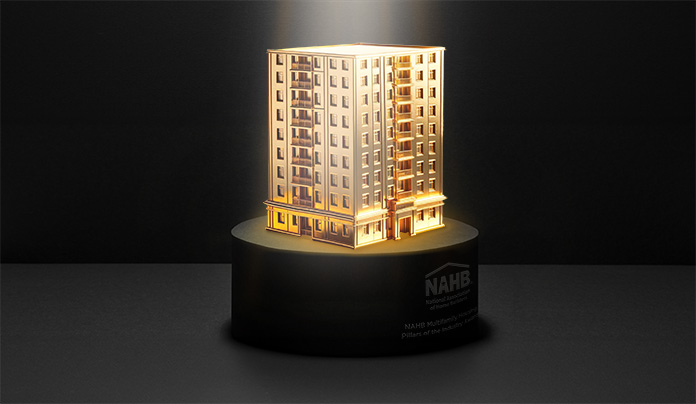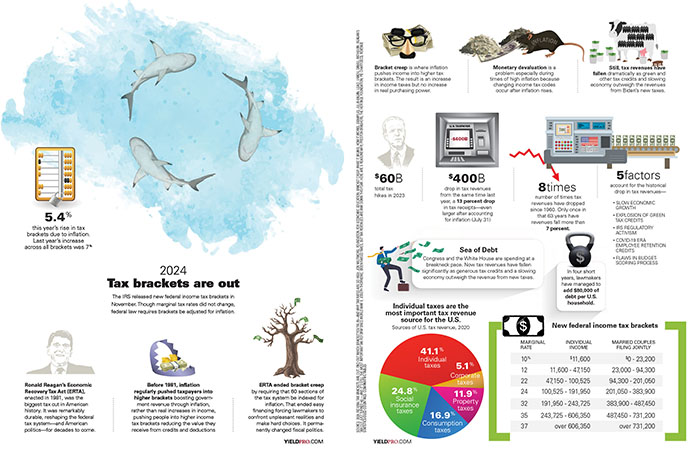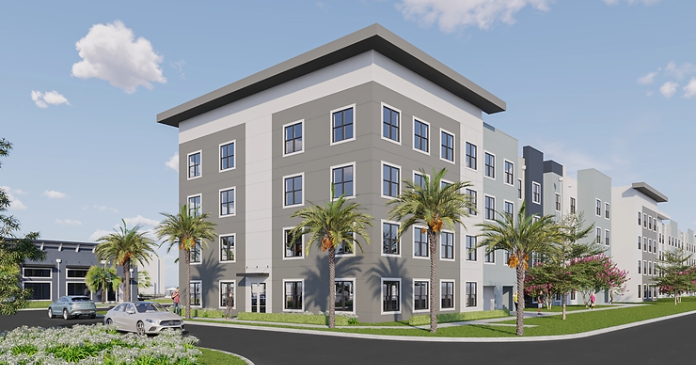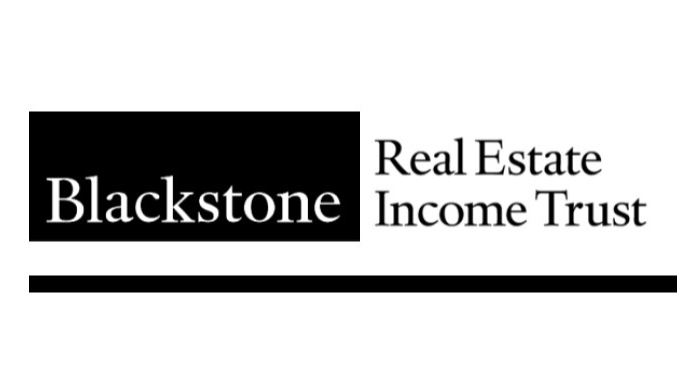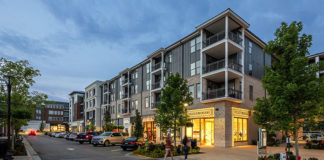Philadelphia-based Korman Communities believes furnished luxury units within amenity-rich and service-laden communities resonate well with a renter demographic that wants ultra-luxury resort living at affordable prices without the long-term rental commitment — even in an economic downturn.
Some apartment experts question just how deep the market for furnished apartments might be, especially during a recession. The corporate housing industry lost 1.2 percent occupancy and shed 5.7 percent of its inventory in 2008 and is expected to contract another 2.9 percent this year, according to the Corporate Housing Property Association (CHPA). Distressed condo units are becoming a competitive issue and some providers have pulled out of markets, while others have closed shop completely, CHPA members report.
But Korman has carved out a unique niche in the furnished apartment sector over the past three decades and is staying the course, claiming occupancy success across its three distinct brands — AVE, AKA and ARK.
“As an example, we delivered two communities straddling the luxury rental and extended-stay markets in Northern New Jersey two years ago that are now more than 95 percent leased, and occupancy is high on both the furnished and unfurnished sides,” said Lea Ann Welsh, president of AVE, a portfolio of six suburban garden-style and mid- rise assets cobbled together three years ago as part of Korman’s major re-branding effort.
Location and flexibility of lease terms are the keys to maintaining high occupancy, say Korman executives who pioneered the furnished apartment concept thirty years ago as Korman Suites, a corporate suite concept of short-term, furnished units in a traditional multifamily residential setting.
AVE communities are located in upscale suburbs close to mass transit with easy access to urban centers. Residents may choose lease terms from 30 days to a year for the brand’s 50/50 mix of one- and two- bedroom apartments that range from 700 to 1,500 sq. ft.
The properties’ units typically are divided equally between furnished and unfurnished. “Being able to offer furnished and unfurnished suites gives us the flexibility to shift occupancy and let the market dictate the number of suites versus the number of unfurnished traditional rentals that we have at any given time, based on business that’s coming in from a big employer in the area,” said Welsh.
While the convenience factor might initially draw renters to AVE’s furnished suites, says Welsh, those tenants often stay longer because of Korman’s customer service and resort-style living.
“Even in this recession we haven’t cut back on our services. Our residents don’t have to go to a beauty salon, because they have it right in their community. They can invite friends over and share a bottle of wine around the pool or sit around the fire pit or have movie night. We offer massage therapy and club breakfasts every morning with Starbucks coffee, Tazo teas, hot chocolate, oatmeal muffins and fresh fruit. They can come down to our cafe, read a local or national paper and say hello to the front desk and drop off dry cleaning and, if new to the area, ask questions about restaurants and entertainment. We have the resources to service our residents, whether they are in furnished or unfurnished units,” said Welsh.
The AVE division evolved as an outgrowth of the company’s AKA brand, launched earlier in 2007, when Korman acquired four urban high-rises targeted for condo conversion and converted them instead into upscale furnished residences for wealthy guests that are operated similar to a hotel. Today, AKA’s portfolio consists of eight ultra-luxury assets, two in Washington, D.C., one in Metro Philadelphia and five in the New York City area.
As for the AVE division, Korman built four of the communities with a local development partner and acquired two towards the end of construction during a brief buying spree in 2007, purchasing the 248- unit AVE Downingtown, just outside of Philadelphia, from the Bozzuto Group and the 169-unit AVE Dulles, near the Dulles Airport in Herndon, Va., from a condo developer who wanted to avoid going to market with for-sale units during the condo bust.
Furnished apartments are a much smaller component, about 20 percent, of the company’s third branded division, ARK. “It is a totally different operating theory, focusing more on the traditional rental,” said Welsh.
Corporate and relocation business travelers and affluent renters-by-choice are the end users of AVE’s furnished apartments. “These people can own a home, but because they might be relocated in a year with their job, or don’t want to cut the grass or deal with the plumbing issues, they choose to rent a place where they are being taken care of,” said Welsh.
Around 25 percent of the 785 residents at AVE’s three New Jersey properties are divorced fathers. “These are people who are leaving a household and have to start over. They might come in for a few weeks or a month and say, ‘I’m not sure what my plans are going to be,’ and then they stay for a few months and decide to stay longer. We help coordinate that, get them furniture and help them set up their utilities and convert their furnished lifestyle into an unfurnished lifestyle without skipping a beat,” she said.
Korman is ready with a $300 million war chest to expand its AKA and AVE brands through acquisition this year, after sitting on the sidelines through 2008. “We’re actively looking for deals, although they are hard to come by right now. We’re waiting for the market to firm up and then we are poised to grow actively again,” said Welsh.
Korman’s target markets for the expansion of the AVE brand include New Jersey, Boston, suburban Philadelphia, Washing-ton, D.C., Northern Virginia, Los Angeles and Stamford, Ct. For the AKA portfolio, Korman is looking to acquire assets in New York City, Los Angeles and London.
Out of the shadows
In Florida, Rilea Group president Alan Ojeda is banking on a year-old, short-term rental program to help boost occupancy at One Broadway, the 366-story, 371-unit apartment tower his company completed three years ago in Miami’s Brickell Financial District, where apartment owners still face stiff competition from a glut of unsold condos delivered since the condo boom went bust. The apartment tower has yet to reach stabilization and currently is 85 percent occupied.
Ojeda formed Rilea Group in 1981 as a developer/builder of single- family homes, shopping centers and strip malls, but began building much larger income-producing properties in the mid-1990s.
Between 1995 and 2003, he developed five garden-style communities and purchased land for two for-sale projects –Floresta and 1080 Brickell, which were permitted but not yet built. One Broadway was planned and delivered as a rental building, but is part of a larger project, called 1450 Brickell, of which the second phase is an office component currently under construction next door.
“When we started this project in 2003, there were not so many condos and we lived in a different world, but despite that, remember that when you are a renter you don’t make a lifetime commitment or a long- term commitment like when you buy a condo or a home. You rent for a year. So, in addition to our traditional units, we’re offering short- term and long-term furnished apartments,” he said.
Ojeda believes that offering furnished luxury units sets One Broadway apart from the prodigious shadow market of condos currently being rented in Miami.
Nearly 23,000 new condo units have been built in the city since One Broadway was completed. Ojeda estimates there are 7,000 in the downtown market alone that remain unsold, although this past summer several foreign buyers paying all cash snapped up blocks of units in absolute auctions at $0.30 to $0.40 on the dollar.
But the shadow supply is only part of the problem facing apartment owners in Miami, said Felipe Escharte, senior associate in Marcus & Millichap’s Ft. Lauderdale office. Reduced salaries and job losses also are contributing to lower vacancy rates. “Tenants just aren’t able to pay the amount of rent they used to and owners like Rilea Group are getting creative in order to fill vacant units,” he said.
Over the past few years, Ojeda saw condo owners become the landlords of choice for renters seeking cheap rents. But some of those tenants are finding they get less than they bargain for as landlords face foreclosure and buildings fall into disrepair as condo association revenues diminish.
“Now those renters are coming back to us,” said Ojeda.
Compared to a condo community that may lack the needed cash to pay for common area utilities and hire more than a skeleton crew, the benefits of a properly run apartment property with 24/7 concierge service and maintenance crew and the amenities of a four-star hotel are enticing.
“Plus, renters don’t have a ‘knock, knock’ on the door every day with someone saying, ‘May I show your apartment please?'” said Ojeda.
He believes these factors are helping to create opportunities for corporate furnished apartments, not just as a way to sail through or weather the storm, but for the long term.
“I know there is a niche serving the corporate world and the minimum stay is thirty days. It’s not very big — around 10 to 15 percent of our building — but it’s constant,” he said.
The majority of corporate housing clients in Miami are foreign buyers of U.S. corporations. “For example, investors from Spain recently bought three banks in the downtown area and the acquiring companies sent crews of accountants and other banking people to do due diligence and complete the closing process,” said Ojeda.
For these people, staying in a furnished luxury apartment costs much less than the average $400-a-night rate for an upscale hotel room, yet offers the space and comfort of full-sized home.
Amenities at One Broadway include valet and 24-hour concierge service, fitness center and entertainment rooms, racquetball court, resort- style swimming pool and spa and a ground-floor plaza with retail shops.
“In the income-producing world, developers are in the pampering business, because you want your tenants to stay. You want your tenants to be the best voice, your best marketing tool to talk to others and praise your building. So we tried to give them a lot of things, a lot of services, a lot of kindness and a lot of good product,” said Ojeda.
With a mix of studios, ones, twos and threes, fully furnished apartments at One Broadway rent for $1.90 per square foot and are available on a month-to-month basis for as little as $79 a night. Annual lease rates for traditional units at the community, depending on floor, size, view, furnished or unfurnished, range from $1,200 for an unfurnished studio to $3,095 for an unfurnished three-bedroom.
Ojeda is bullish on the urban nature of Miami’s downtown market, pointing to the area’s growing night life and proliferation of restaurants. “In all of Florida there is not one single urban city. It’s a huge suburbia, very similar to Los Angeles, where you don’t have the feeling of the city and the only place you get that feeling is in the heart of Miami.
“It’s becoming an urban environment where you can actually walk to work, shop, and dine and there are even some new schools. Now there are a lot of people who say it’s cool to live here, and, in Miami, urban means you live in a high-rise market.
“Miami is a gateway city that benefits from a steady stream of international commerce. This has helped us keep our unemployment rate lower than the rest of the state and the national averages. Once the banking and financial sectors stabilize, we will see credit flow again, and companies will be able to expand with confidence,” he said.
Escharte already is seeing a glimmer of hope for Miami’s apartment sector. “Sellers’ expectations are coming down. A lot of money has been sitting on the sidelines since the condo craze and, as sellers become more realistic with their expectations, we are seeing more transactions and buying on fundamentals,” he said.



